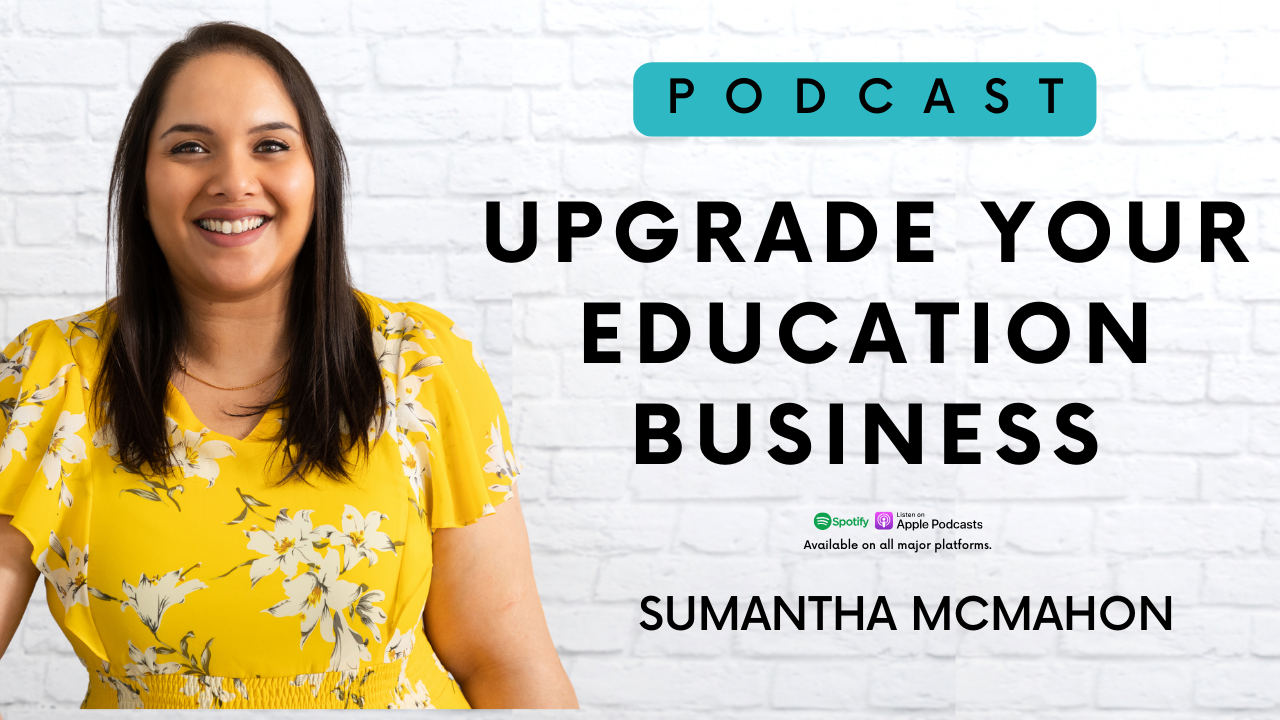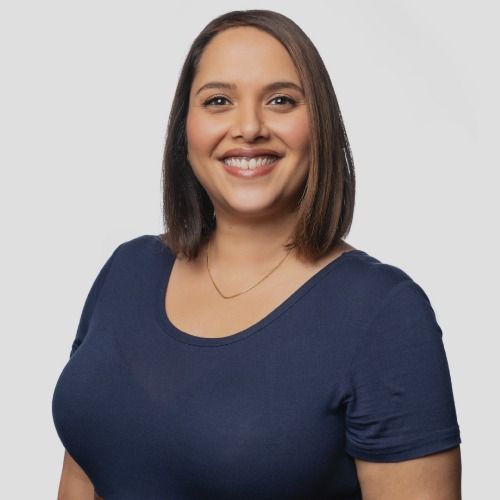full
173 This Underrated Learning Technique Will Make Your Business Stronger
In this episode I share a simple practice you can use to grow your tutoring or education business. By paying attention to your own experiences as a consumer, you can strengthen your marketing, improve sales and create better client relationships.
I give practical examples on marketing, content, pricing, boundaries, delivery and systems. These will help you attract more clients, work more effectively and build a business that feels professional and sustainable.
Enjoy :-)
Sumantha
____________________
👋🏽 Hello! I'm Sumantha McMahon, and I've supported over 100 tutors and education business owners.
As a teacher 'dropout' turned professional tutor, combined with my 20+ years as a business owner, I'm in it with you! Yes, I'm qualified too :-)
My training leans on tried-and-tested methods that are completely tailored to our niche.
Work with me to breathe life into YOUR definition of success:
High-touch 6-month programme for tutors who want to make their business more lucrative, in a sustainable way for the future, while protecting the impact they make.
The leading membership for tutors that combines tailored training (live and recorded), a community of like-minded business owners and exclusive discounts.
Get lifetime access to this self-paced course designed to help you launch, grow and refine your group classes. Includes teaching ideas too.
This podcast is recorded using Riverside. Sign up for your account here (free plan available)
____________________
Sometimes, I share links to resources and apps that I recommend. They are all based on my experience - if I don't love them, I don't recommend them. In some cases, I earn a small commission for my recommendation, at no cost to you.
© 2024 Sumantha McMahon
Transcript
Welcome to another episode. Today I'm going to share something that every single one of us can implement into our business, and it's really powerful. You can do this without any particular training or skill or even experience.
Sumantha:If you're new here, I'm Sumantha McMan, and this is the podcast that's designed for people working in the education space. You are going to love being here. It's full of action focused advice, as well as powerful insights from myself and special guests.
Sumantha:So back to this one thing that you can implement right now that's going to change things. Well, I have to start with a quick story.
Sumantha:When I was in my twenties, I was working corporately in the business training world, and I got my first leadership position. Even now, when I think back to it, I can still feel the nerves creeping in because honestly, I didn't have enough experience. I didn't have the maturity. I hadn't been to any leadership training.
Sumantha:I'd never been taught, and yet there I was thrown into this position leading people who were older than me, and in many cases more experienced. In my twenties, I had that wonderful mix of naïve confidence and sheer enthusiasm, which probably carried me further than it should have.
Sumantha:With hindsight, I probably would hesitate much more today. But even back then, there must have been a part of me that recognised I couldn't just stroll into that role and wing it. So in the absence of learning and training, I came up with my own compass.
Sumantha:I thought, what if I just think about all the things I have loved about people I've worked for? I reflected on what I admired, how they made me feel, and why those behaviours really stuck with me. And just as importantly, I thought about the things I didn't love, the moments that frustrated me or made me feel undervalued, and I promised myself not to repeat those patterns.
Sumantha:And you know what? It worked. Not perfectly of course. I made plenty of mistakes. I stumbled through challenges. But that approach gave me a foundation.
Sumantha:What's interesting is that way of thinking has never really left me. It's become my default way of operating in business. Not because I lack confidence, but because I know there's always something more to learn. There's always someone doing something differently that might spark a new idea.
Sumantha:So I want to share that with you today and show you how this little practice, this idea of reflecting on what you love and don't love around you, can help you in your own business. Done well, it can help you work with more people, spread your impact further, make more money, and crucially create more space in your life.
Sumantha:When I sat down to unpack how I use this process now, I realised it's so ingrained that I almost don't notice it anymore. So I’ve outlined some really practical examples.
Sumantha:The first one is marketing and selling. I'm always absorbing my experiences as a consumer. There are people I admire, I like them, but whenever I see their posts, I scroll straight past. It's because every single thing they're putting out there is selling. Sometimes they’re selling different things at once, and the result is I feel confused and tired.
Sumantha:That’s not the energy I want to bring to my audience. So I sell in phases. I stop outside of that sales window. I go back to connection, relationship building, sharing insights, having conversations. It works time and time again because people get clarity and they don’t feel bombarded.
Sumantha:The second practical use is content creation. I pay close attention to the kind of content that pulls me in. The type that makes me pause mid-scroll and consume more and more. When I notice that, I ask myself: what made me stop? Was it the story, the phrasing, the image, the hook? And then I think about how to model that effect in my own content.
Sumantha:The third thing is client experiences. I remember being in memberships or courses that felt overwhelming. I didn’t know my next step. When I designed my own membership or accelerator, I made sure to create roadmaps, guides, reminders and direct access to me so clients feel clear and supported.
Sumantha:The fourth area is pricing and positioning. Think about the last time you bought something where the price didn’t match the experience. That mismatch leaves a mark. For me, I want people to feel that the value of what they receive is greater than the investment.
Sumantha:Next is boundaries and client relationships. I’ve worked with people where it felt like they were on call all the time. At first it’s great, but later it feels uncomfortable. So I set clear communication boundaries. They’re healthy and sustainable, and my clients respect them.
Sumantha:Another area is delivery style. We’ve all been in sessions where someone just talks at us for an hour. It drains the life out of people. So in my workshops and mastermind sessions, I build in pauses, interaction and opportunities to connect.
Sumantha:I also learned from performing as a singer. I used to feel pressured to make jokes or banter. Then I saw a band where the singer simply enjoyed himself. That joy was infectious, and it changed how I performed. It taught me that presence and enjoyment can be more powerful than forced banter.
Sumantha:Finally, systems and processes. When you sign up for something and the onboarding is clunky, you feel uncertain. I never want my clients to feel that. So I’ve built processes that feel smooth, easy and reassuring. Even if it’s automated, I make sure clients feel supported from the first click.
Sumantha:Here’s the takeaway. Your experience is bigger than your own business. Everything you consume, every sales pitch that irritates you, every great experience that lights you up — all of it can shape how you run your business.
Sumantha:So try this over the next week. Pay attention as a consumer. Note down what grabs you and what irritates you. Then look at that list as a business owner. Ask yourself how you can avoid the things you don’t love and replicate the things you do.
Sumantha:It sounds simple, but over time it becomes a powerful habit. It sharpens your marketing, makes your selling more effective, and ensures your client experiences feel thoughtful, intentional and professional.
Sumantha:And just like me in my twenties, you don’t need to wait for perfect training or circumstances. You can start learning from the world around you right now. Thank you as always for joining me, and you’ll hear from me on Wednesday.


